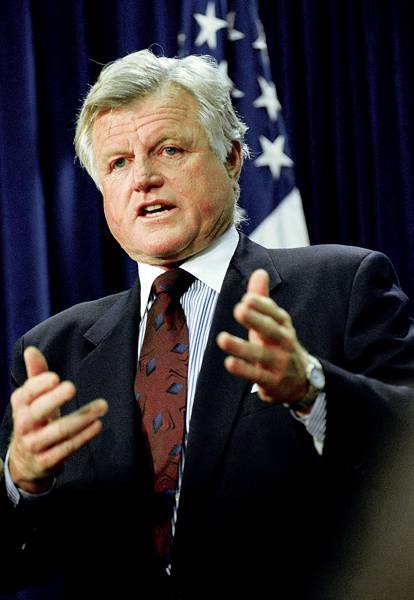Faculty reacts to death of Ted Kennedy

FILE – In this Oct. 25, 1990 file photo, Sen. Edward M. Kennedy, D-Mass. talks to reporters at a news conference on Capitol Hill in Washington, D.C. Massachusetts Sen. Edward M. Kennedy has died after a yearlong battle with a brain tumor. (AP Photo/John Duricka, File)
August 26, 2009
“It’s hard to think of the American political process without a Kennedy involved,” said Mack Shelley, professor of political science and statistics. “It’s the end of an era.”
Senator Edward “Ted” Kennedy, D-Mass., died Tuesday of brain cancer, after being diagnosed in May 2008. He was 77. Following Kennedy’s funeral Saturday, he will be laid to rest at Arlington National Cemetery.
Kennedy’s work may have seemed far from Ames, but his efforts throughout the years were apparent for college students.
In 1970, he “amended the Voting Rights Act to lower the voting age to 18, laying the basis for a constitutional amendment moving the voting age from 21 to age 18,” according to New Jersey On-Line.
While Kennedy was chairman of the Senate Labor and Human Resources Committee, he worked with former President Clinton to “establish the Direct Lending program which allowed the U.S. Department of Education to provide low-cost loans to college students to cover education expenses,” according to New Jersey On-Line.
Shelley said he believes Kennedy’s recent push for health care reform with the Obama administration made the news of his death more troubling.
“Who can replace him?” Shelley said. “I can’t think of any Kennedy persona [in politics] right now.”
Shelley said although Kennedy’s death is a loss, some Democrats might try to seize this opportunity and label a new health care bill the “Kennedy Memorial Health Bill.” In doing this, he said, they might garner more support from current opponents, since Kennedy was well-known and respected throughout the political community.
Shelley said around a week ago, Kennedy talked to the current governor of Massachusetts, Democrat Deval Patrick, about changing a law that had recently been changed regarding the governor’s ability to appoint people to positions once they were vacant. The concern is that a governor would try and appoint someone with a political ideology to similar to their own.
“There may be a period of time where no one is holding Kennedy’s former seat,” Shelley said. “But it would be suicidal not to appoint another Democrat.”
In a speech at the 1980 Democratic National Convention, Kennedy said, “For all those whose cares have been our concern, the work goes on, the cause endures, the hope still lives, and the dream shall never die.”
Kennedy, the youngest of nine children, exuded the same traits as the rest of his brothers. His vigorous personality and big, booming voice gave him what Shelley called the “Kennedy persona.”
This persona, in turn with his progressive perspectives, landed him the nickname “the liberal lion.”
During his 47-year career as a senator, Kennedy was deeply involved in issues of health care and health education. These issues hit home for Kennedy since his late older sister, Rosemary Kennedy, was born mentally disabled. After an unsuccessful lobotomy, she became severely handicapped for the rest of her life until her death in 2005.
In regards to Kennedy’s decades-long involvement in the health care debate, Shelley said, “He was seen as someone who could build bridges between Republicans and Democrats on issues such as health care.”
Reports from CNN contributed to this article.






